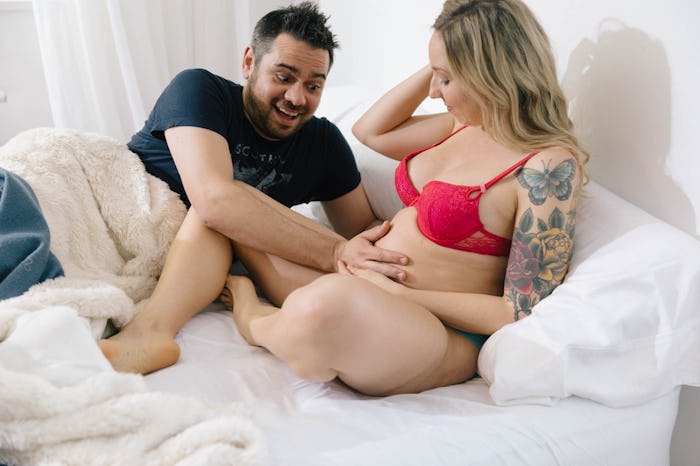Life
When Can You Feel Your Baby Move? Get Ready, Soon-To-Be Moms
For me, feeling my baby move was by far my favorite part of pregnancy. At least, that is, until I had to endure kicks to the bladder all day long. I found it really reassuring to feel those kicks and punches, though, because for as beautiful as pregnancy is, it can also be totally nerve-wracking and stressful and terrifying. You continue to worry and wonder, until you start feeling those flutter and kicks across your uterus each day. So, when can you feel your baby move and know that they are doing fine? Turns out, it might be sooner rather than later, so get ready, mom-to-be.
According to experts at BabyCenter, when you feel the first flutters or kicks of you baby moving depends entirely on you and your body, with most moms-to-be feeling their babies move sometime between 16 and 22 weeks gestation. Different factors, such as being a first-time mom, your body type, or whether you have an anterior placenta can impact when it happens for you, though. Because every body and pregnancy is be different, the American Pregnancy Association (APA) warns moms-to-be to not compare their experience to others' or to their previous pregnancies, and to remember that as in most things related to pregnancy, the "normal" time to start feeling baby kicks is a pretty wide range — anywhere from 13 to 25 weeks gestation. In other words, you can have a general idea of when to expect an internal bump here or there, but don't worry if 13 weeks comes and goes without so much as a flutter. Your baby, like you, is unique.
According to BabyCenter, most moms-to-be can expect to begin feeling their baby move or "quicken" sometime between 16 and 22 weeks gestation. Pregnant people tend to describe these first movements not as kicks, but as feeling like the flutter of butterfly wings, pops, a fish swimming, or gas bubbles. The site notes that because they know what they are feeling, women who have been pregnant previously tend to report feeling movement earlier than first-time moms. In fact, some moms say they felt kicks as early as 13-weeks gestation.
The APA says you can expect your baby's first movements to be erratic and irregular, as the still-growing fetus (or two!0 isn't big enough for you to feel their every move. Later on in your pregnancy you should be able to recognize movement patterns, such as sleep cycles and responses to lying in certain positions, or even hot and cold foods or beverages, as your baby continues to grow into, you know, an actual human being with fully-formed limbs.
According to What to Expect, other factors might cause you to feel your baby move later in your pregnancy. An anterior placenta — a placenta that has developed on the front side of your uterus — can cushion your baby and prevent you from feeling early movements, as well as keep your provider from hearing their heartbeat with a doppler (which can be totally nerve-wracking, by the way). The same site notes that thin women are likely to feel their baby move sooner than overweight women, for pretty much the same reason.
According to BabyCenter, you may not feel regular baby kicks or punches from until the third trimester, when your fetus will bump against you every time they turn and shift positions. That's when you can expect your baby to develop their own pattern of regular movement as your pregnancy progresses. It's important for you to start paying attention to what's normal for your baby, so that you can let your doctor or midwife know if anything changes. Some doctors recommend that you "count baby kicks" each day and let them know if you don't feel at least 10 movements in a two hour period, as it may indicate a problem.
There's nothing like feeling your baby kick and move to remind you that they are there and OK. Try to enjoy these special moments and not to worry. If anything changes, though, be sure to call your doctor to check things out and kick any concerns to the curb. After all, that's what they're there for.
Watch Romper's new video series, Romper's Doula Diaries:
Check out the entire Romper's Doula Diaries series and other videos on Facebook and the Bustle app across Apple TV, Roku, and Amazon Fire TV.
